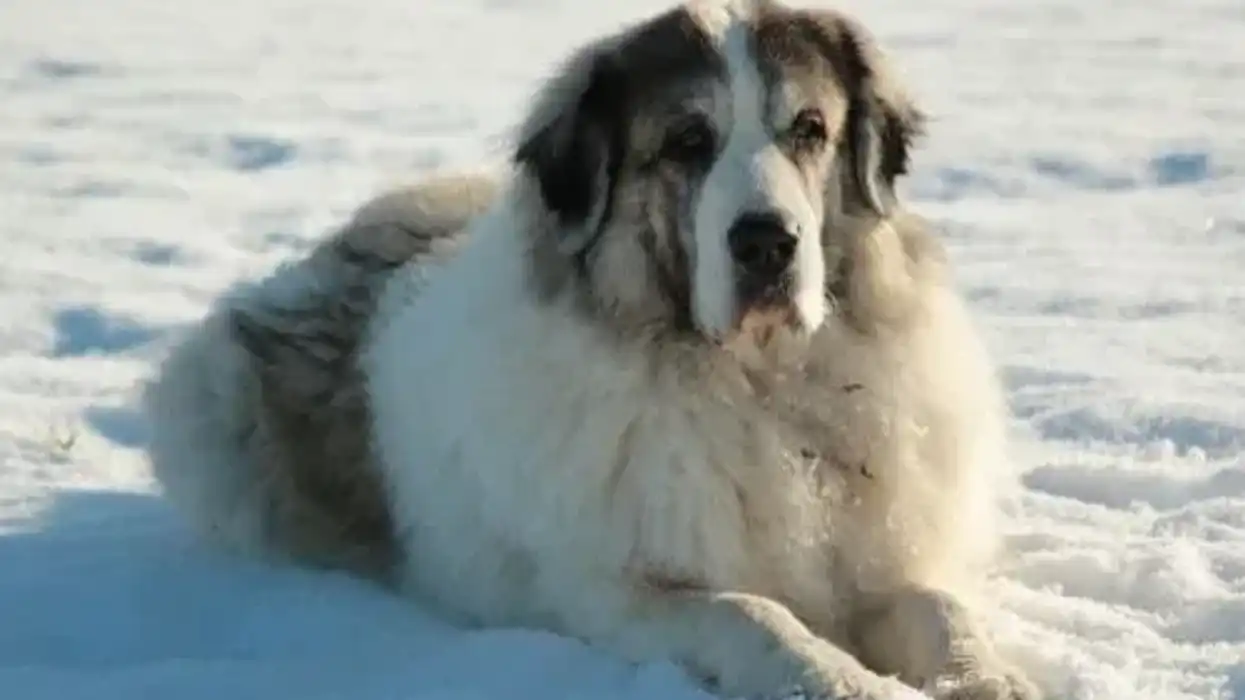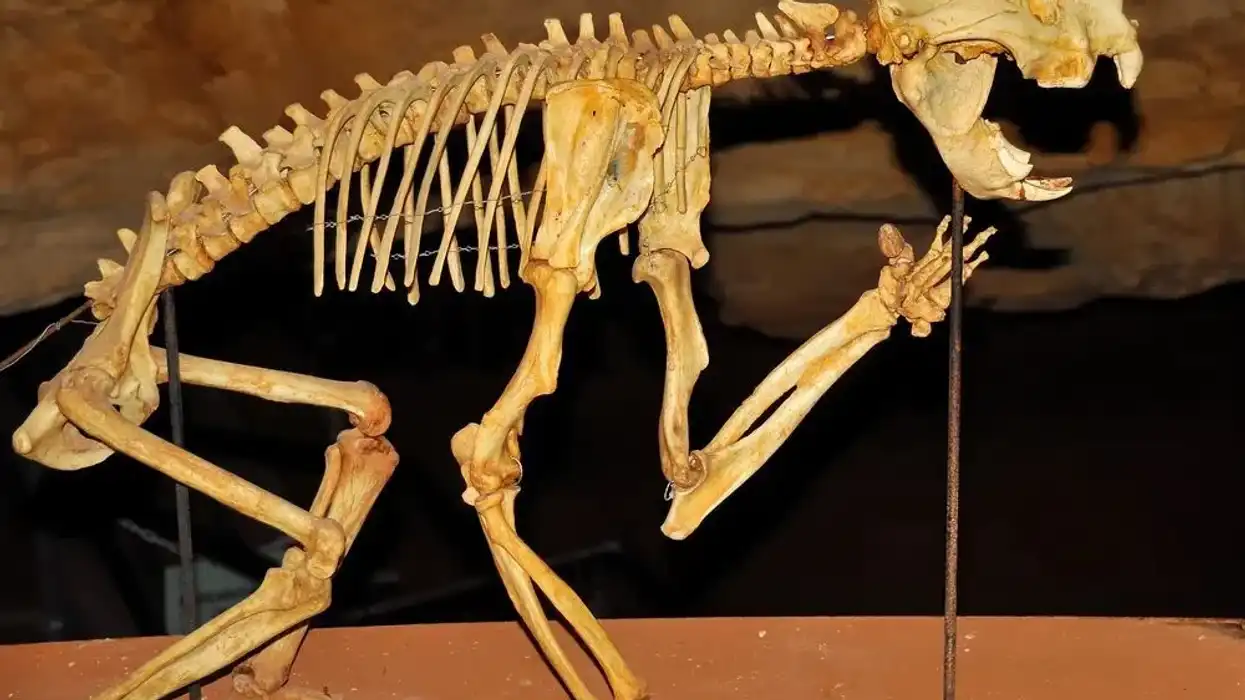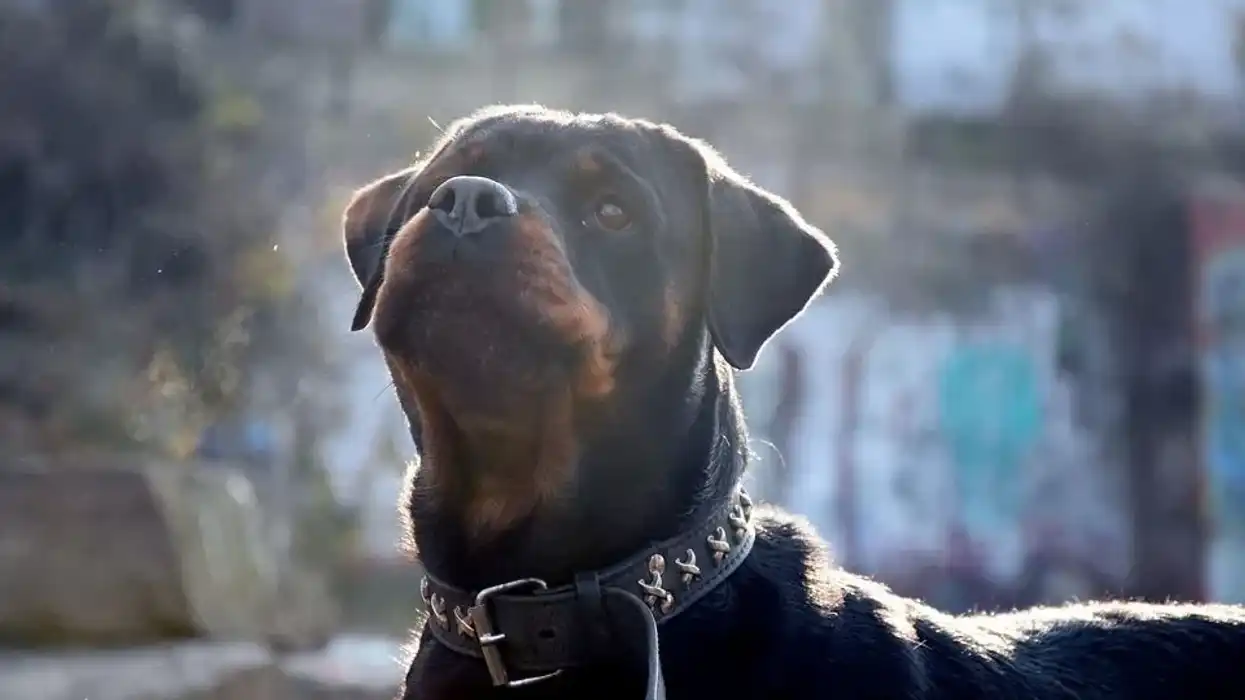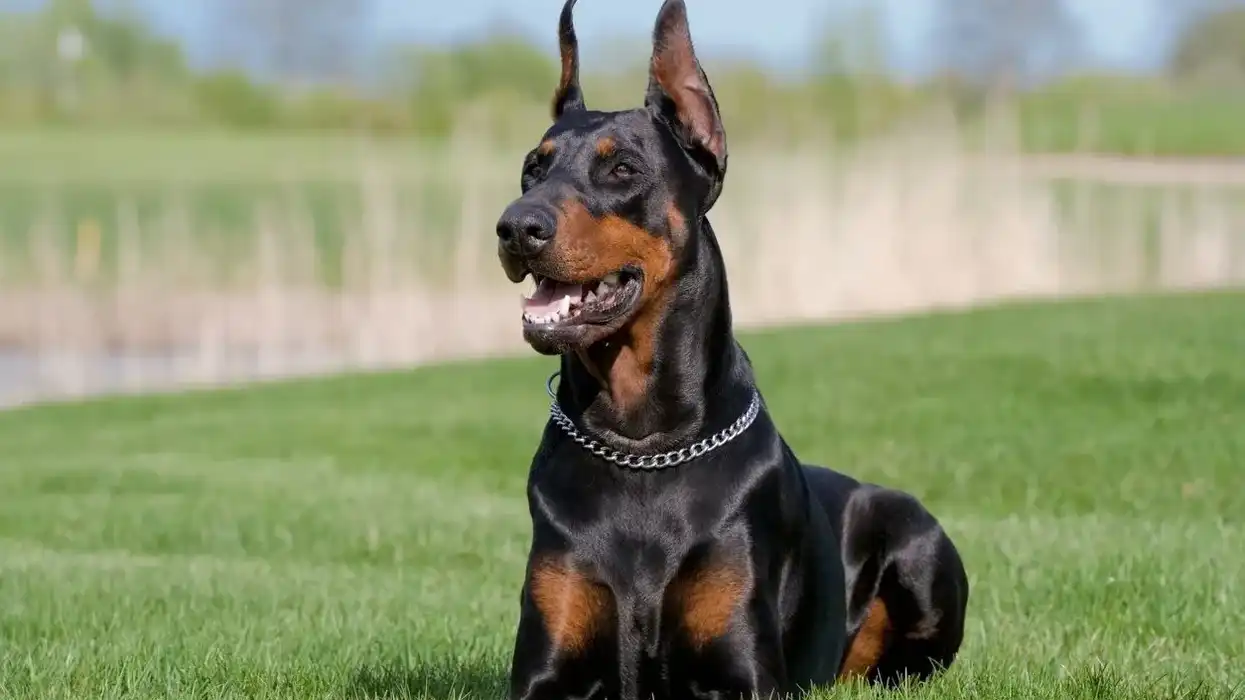Fun Pyrenean Mastiff Facts For Kids

Content
- What type of animal is a Pyrenean Mastiff?
- What class of animal does a Pyrenean Mastiff belong to?
- How many Pyrenean Mastiffs are there in the world?
- Where does a Pyrenean Mastiff live?
- What is a Pyrenean Mastiff's habitat?
- Who do Pyrenean Mastiffs live with?
- How long does a Pyrenean Mastiff live?
- How do they reproduce?
- What is their conservation status?
- What do Pyrenean Mastiffs look like?
- How cute are they?
- How do they communicate?
- How big is a Pyrenean Mastiff?
- How fast can a Pyrenean Mastiff run?
- How much does a Pyrenean Mastiff weigh?
- What are the male and female names of the species?
- What would you call a baby Pyrenean Mastiff?
- What do they eat?
- Are they slobbery?
- Would they make a good pet?
- Did you know...
- How much weight can a Pyrenean Mastiff support?
- Getting your own Pyrenean Mastiff
The Pyrenean Mastiff dog is somewhat of a hidden gem, and only entered the limelight very recently. Essentially a gentle, herding dog this livestock guardian breed also has a protective and violent streak when it comes to having to protect their territory or family.
This large dog breed is native to Pyrenees Mountains in Spain where it is known as Mastín del Pirineo.
The Pyrenean Mastiff is known to have a calm and mild temperament, making it the perfect family dog.
They can also double up as an effective guarding and working-class dog, owing to their intelligence and intuitiveness regarding human behavior and emotions. In fact, the American Kennel Club describes this dog as a gentle, brave, and noble dog with a friendly temperament.
Their high energy levels can be managed through regular training, exercise, and grooming. These large breed dogs were kept as pets by people to protect their sheep and other livestock from wolves and bears.
Did these gentle giants rouse your interest? Peruse ahead and get to know some amazing and interesting facts about these adorable and smart canines. After reading this Pyrenean Mastiff information, you may also read Tibetan Mastiff facts and pitbull mastiff mix facts.
Pyrenean Mastiff Interesting Facts
What type of animal is a Pyrenean Mastiff?
A Pyrenean Mastiff (Mastín del Pirineo) is a large dog breed which is native to the Pyrenees Mountains, they belong to the biological family of canidae and the genus of canis. The scientific name assigned to the Pyrenean Mastiff is the Canis lupus familiaris.
What class of animal does a Pyrenean Mastiff belong to?
The Pyrenean Mastiff is classified as a mammal since it has fur and is a warm-blooded creature. This dog breed is regarded as a livestock guardian breed that was originally bred in the Pyrenees Mountains. Despite being quite aggressive, these dogs are known for their gentle and calm temperament.
How many Pyrenean Mastiffs are there in the world?
With only about 4,000 Pyrenean Mastiffs across the globe, this breed of dog is fairly rare. While their existence is not threatened at the moment, their health requires adequate care to ensure their longevity. The origin of this breed can be traced to Pyrenees Mountains, where they were bred to care for sheep and other livestock.
Where does a Pyrenean Mastiff live?
The great Pyrenean Mastiff dog was originally bred to be a shepherd and herding dog for sheep, livestock and cattle, as well as protect them from predators like wild wolves. Ergo, this breed of dog is best found living at a farm or in a house with loving owners.
While this breed originated in Pyrenees Mountains of Spain, it can now be found all across the world.
What is a Pyrenean Mastiff's habitat?
The Pyrenean Mastiff’s habitat would ideally include a farm with plenty of space to roam. Along with that, this breed of dog is perfect as a cattle and livestock guardian. Alternatively, their habitat could be a large house in which they lives with their family. They require regular exercise to manage their weight and health status.
Who do Pyrenean Mastiffs live with?
Since the Pyrenean Mastiff is a breed that was created for the specific purpose of taking care of a person’s cattle and livestock (cows, buffalos and sheep), globally and historically, Pyrenean Mastiffs have always been found to cohabit with human beings and livestock animals.
How long does a Pyrenean Mastiff live?
The Pyrenean Mastiff lifespan is expected to be around 12 to 15 years of age. The life expectancy of this livestock guardian large breed can increase if these Spanish Mastiff dogs are properly taken care of, along with professional training and weight management.
How do they reproduce?
The general principle that the Pyrenean Mastiff follows in order to procreate is the same as every other breed of dog.
The procreation process is initiated by the male wherein he declares his interest in the female by sniffing her private parts.
If the female wishes to proceed with mating with that particular dog then she will flag him (which means she will move her tail to one side). Once this communication of consent is declared, the dog usually mounts the female and begins the process of procreative intercourse.
Having done this, if impregnated, the female will be pregnant for a time period of 60 to 65 days, following which the female will give birth to a litter of puppies which, in the case of the Pyrenean Mastiff, can be as big as ten puppies.
What is their conservation status?
Pyrenean Mastiffs have become a rare breed of dog to come across with only about 4,000 dogs in existence. Their population remarkably decreased during the Spanish Civil War. However, no specific conservation status has been awarded to this breed. Though, proper attention to their health is required along with weight management, to improve their quality of life.
Pyrenean Mastiff Fun Facts
What do Pyrenean Mastiffs look like?
Pyrenean Mastiffs are essentially a giant dog. Male Pyrenean Mastiffs are normally as tall as 30 in (76 cm) and sometimes more than that, whereas female Pyrenean Mastiffs are as tall as 28 in (71 cm).
These massive dogs also weigh about as much as the average Joe, roughly 179 lb (81 kg).
This breed of dog is extremely strong, and their muscles are clearly visible upon shaving off their thick coat of fur. They have an oblong head, with their snout being as broad as the dome of their skull.
Unlike other mastiffs, the Pyrenean Mastiff’s lips are not constantly drooping or hanging from their snout, resulting in excessive drooling tendencies.
On the contrary, their lips are quite close to their jaws. Owing to the work they were created for, their teeth are huge and they have strong jaws and a large bite.
Their ears hang down from the skull. Like other mastiffs, they share the possession of a thick and strong neck with a lot of sagging skin around the neck and chest area, and the body is fairly squared with muscular legs and back.
Even the tail is known to be a strong appendage to the already large and muscular physique of the dog.
Generally, the Pyrenean Mastiff is endowed with a thick coat of fur that is rough to touch. The most observed colors on this breed are a larger portion of white with patches of either black, brown, grey, golden, beige, or sand-colored.

*Please note that this picture is of a Pyrenean Mountain Dog, not a Pyrenean Mastiff. If you have a picture of a Pyrenean Mastiff please let us know at hello@kidadl.com.
How cute are they?
Since these dogs are large in size and very bulky and muscular, it would be untrue to call them cute. Rather these dogs are quite formidable to look at. With proper training, owners can manage their energy levels efficiently.
How do they communicate?
Pyrenean Mastiffs have a deep, gruff, and loud bark that they use to communicate any form of danger to its family or owner. Much like other dogs, they will also bark to indicate displeasure or discomfort.
They will wag their tail to indicate that they are feeling playful or excited.
Like most other dogs, when threatened with danger, the Pyrenean Mastiff will bare their teeth to reveal their large canines, and their fur will be on end with their ears perked. To display affection, the Pyrenean Mastiff typically licks the person or animal it wishes to shower affection upon.
How big is a Pyrenean Mastiff?
Male Pyrenean Mastiffs are normally as tall as 32 in (81 cm) and sometimes more than that, whereas female Pyrenean Mastiffs are as tall as 30 in (76 cm). These massive dogs also weigh around 179 lb (81 kg), but they can be heavier than that.
That means the Pyrenean Mastiff would weight the same as two golden retrievers put together, and on their hind feet, they would easily be taller than the average-sized man.
How fast can a Pyrenean Mastiff run?
Even though the Pyrenean Mastiff has a towering physique that is not ideal for running, they don't slack off when it comes to athleticism. However, this breed of dog would not be as fast as a German Shepherd and would only be able to sustain a top running speed of roughly 25 mph (40 kmph) for short bursts.
How much does a Pyrenean Mastiff weigh?
These massive dogs weigh around 179 lb (81 kg), but they can be even heavier than that, extending up to about 200 lb (90 kg).
What are the male and female names of the species?
As Pyrenean Mastiffs are members of the canidae family, they are dogs. Therefore the male members of his species are referred to as dogs while the female Pyrenean Mastiff is referred to as a bitch.
What would you call a baby Pyrenean Mastiff?
A baby Pyrenean Mastiff, ultimately being a dog, would be referred to as a Pyrenean Mastiff puppy or a pup.
What do they eat?
Pyrenean Mastiffs, being a large and muscular domesticated dog, don't prey on other animals for their food requirements. Ergo, their food must be provided by their family of humans.
In order to ensure the best health of a Pyrenean Mastiff, they must have a filling and wholesome diet. This can be achieved by feeding them top-grade dry dog food or kibble.
If you wish to adopt a more natural and easily available diet, you can feed them different types of fruits, vegetables, chicken, and other low-fat meats and eggs. Proper exercise, training and grooming must be provided to these dogs along with nutritious food for ensuring better health.
Are they slobbery?
In comparison to other mastiffs, Pyrenean Mastiffs are not quite as slobbery. However, owing to the anatomy of its head and jaws, slobber is inevitable. Therefore, while this breed of dog is slobbery, it should not be much of a problem, especially if you live on a farm.
Would they make a good pet?
Pyrenean Mastiffs are a large breed dog, and quite naturally, these Spanish Mastiff dogs need a lot of space to be comfortable. Having said that, if you live in a villa or a farm, the Pyrenean Mastiff would make an excellent pet.
The fact of the matter is that these gentle giants don’t really need high-intensity exercises. Rather, they would prefer taking a slow walk over long distances.
Because they are even tempered and calm, it is easy to train Pyrenean Mastiff dogs from a very young age. If proper care, training, exercise and grooming are provided by the owners, they can live for a bit longer than the usual lifespan of 12 to 14 years.
Moreover, this aggressive breed is extremely protective of its family and will do whatever it needs to guard them against any danger. However, this violent streak only surfaces when they feel their loved ones are threatened.
At other times, it will be perfectly calm and compassionate with their family. In fact, this breed is quite intelligent with babies and humans. The only thing that must be paid attention to is when your Pyrenean Shepherd is around any baby, just because of their size.
Did you know...
The Pyrenean Mastiff breed’s genesis cannot be pinpointed with accuracy. The only hint that people have about their origin is the fact that these dogs might be a part of the lineage of molossers that found their way to Spain by Phoenicians.
Ergo, there is a strong possibility that this breed is over 3,000 years old. Their numbers plummeted due to the eradication of forests and consequently predators such as bears and wolves, since without these predators there was no need for a livestock guard dog.
This breed is naturally prone to the threat of gastric dilation volvulus, better known as bloating.
Their health conditions can be managed with help of regular monitoring and proper training. When you compare Pyrenean Mastiff vs Saint Bernard, the Pyrenean Mastiff is a heavier breed which can weigh up to 180 lb (81 kg) when compared to 150 lb (68 kg) for the Saint Bernard.
When you compare Pyrenean Mastiff vs Great Pyrenees in terms of barking tendencies, the Great Pyrenees is found to have a higher tendency to bark when compared to the Pyrenean Mastiff.
How much weight can a Pyrenean Mastiff support?
A Pyrenean Mastiff is a heavy dog weighing almost 180 lb (81 kg). Owing to their heaviness and size, their body can support up to 44-66 lb (19-29 kg) in weight.
Getting your own Pyrenean Mastiff
The Pyrenean Mastiff puppy, owing to their rare population, is quite hard to come across, even in their native continent. Ergo, Pyrenean Mastiff prices are quite steep, and start at around 1,500 USD. These prices can even go up to 2,000 USD.
Here at Kidadl, we have carefully created lots of interesting family-friendly animal facts for everyone to discover! Learn more about some other mammals including neapolitan mastiff, or bullmastiff.
You can even occupy yourself at home by drawing one of our Pyrenean Mastiff coloring pages.
We Want Your Photos!
More for You
Sources
https://en.wikipedia.org/wiki/Pyrenean_Mastiff
https://www.akc.org/dog-breeds/pyrenean-mastiff/
https://dogtime.com/dog-breeds/pyrenean-mastiff
See All
Master of Computer Science

Abhijeet ModiMaster of Computer Science
An experienced and innovative entrepreneur and creative writer, Abhijeet holds a Bachelor's and Master's degree in Computer Application from Birla Institute of Technology, Jaipur. He co-founded an e-commerce website while developing his skills in content writing, making him an expert in creating blog posts, website content, product descriptions, landing pages, and editing articles. Passionate about pushing his limits, Abhijeet brings both technical expertise and creative flair to his work.
Bachelor of Technology specializing in Information Technology

Smriti ChaudharyBachelor of Technology specializing in Information Technology
Smriti, a student data scientist, and coder, is pursuing her Bachelor of Technology at K.J. Somaiya College of Engineering. She has achieved top rankings in the International English Olympiad, National Spelling Bee, and PSAT/SAT English Section. She is experienced in content creation and editing for various academic institutions.
Disclaimer
1) Kidadl is independent and to make our service free to you the reader we are supported by advertising. We hope you love our recommendations for products and services! What we suggest is selected independently by the Kidadl team. If you purchase using the Buy Now button we may earn a small commission. This does not influence our choices. Prices are correct and items are available at the time the article was published but we cannot guarantee that on the time of reading. Please note that Kidadl is a participant in the Amazon Services LLC Associates Program, an affiliate advertising program designed to provide a means for sites to earn advertising fees by advertising and linking to Amazon. We also link to other websites, but are not responsible for their content.
2) At Kidadl, we strive to recommend the very best activities and events. We will always aim to give you accurate information at the date of publication - however, information does change, so it’s important you do your own research, double-check and make the decision that is right for your family. We recognise that not all activities and ideas are appropriate for all children and families or in all circumstances. Our recommended activities are based on age but these are a guide. We recommend that these ideas are used as inspiration, that ideas are undertaken with appropriate adult supervision, and that each adult uses their own discretion and knowledge of their children to consider the safety and suitability. Kidadl cannot accept liability for the execution of these ideas, and parental supervision is advised at all times, as safety is paramount. Anyone using the information provided by Kidadl does so at their own risk and we can not accept liability if things go wrong.
3) Because we are an educational resource, we have quotes and facts about a range of historical and modern figures. We do not endorse the actions of or rhetoric of all the people included in these collections, but we think they are important for growing minds to learn about under the guidance of parents or guardians.







